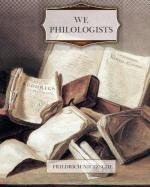This was a historical fact, and it was thus thought that no harm could come of any dealings with antiquity. Yes, it is so plausible to say that we find Christian ethics “deeper” than Socrates! Plato was easier to compete with! We are at the present time, so to speak, merely chewing the cud of the very battle which was fought in the first centuries of the Christian era—with the exception of the fact that now, instead of the clearly perceptible antiquity which then existed, we have merely its pale ghost; and, indeed, even Christianity itself has become rather ghostlike. It is a battle fought after the decisive battle, a post-vibration. In the end, all the forces of which antiquity consisted have reappeared in Christianity in the crudest possible form: it is nothing new, only quantitatively extraordinary.
160
What severs us for ever from the culture of antiquity is the fact that its foundations have become too shaky for us. A criticism of the Greeks is at the same time a criticism of Christianity; for the bases of the spirit of belief, the religious cult, and witchcraft, are the same in both—There are many rudimentary stages still remaining, but they are by this time almost ready to collapse.
This would be a task . to characterise Greek antiquity as irretrievably lost, and with it Christianity also and the foundations upon which, up to the present time, our society and politics have been based.
161
Christianity has conquered antiquity—yes; that is easily said. In the first place, it is itself a piece of antiquity, in the second place, it has preserved antiquity, in the third place, it has never been in combat with the pure ages of antiquity. Or rather: in order that Christianity itself might remain, it had to let itself be overcome by the spirit of antiquity—for example, the idea of empire, the community, and so forth. We are suffering from the uncommon want of clearness and uncleanliness of human things; from the ingenious mendacity which Christianity has brought among men.
162
It is almost laughable to see how nearly all the sciences and arts of modern times grow from the scattered seeds which have been wafted towards us from antiquity, and how Christianity seems to us here to be merely the evil chill of a long night, a night during which one is almost inclined to believe that all is over with reason and honesty among men. The battle waged against the natural man has given rise to the unnatural man.
163




